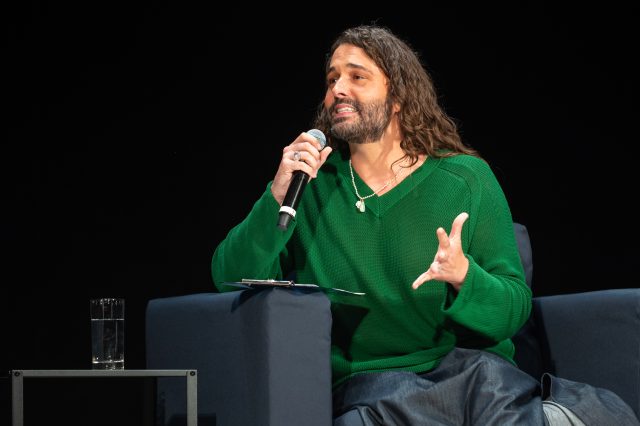[ad_1]
In a live broadcast of the podcast Getting Curious, host Jonathan Van Ness was joined by Jenna Bednar, University of Michigan public policy and political science professor, Public Policy Dean Celeste Watkins-Hayes and two student leaders at the Michigan Theater Friday evening. They discussed voting access, voter turnout and political tensions on college campuses. The event was hosted by the Ford School of Public Policy as part of their Year of Democracy, Civic Empowerment, and Global Engagement initiative.
LSA juniors Maurielle Courtois and Hillary Poudeu Tchokothe, co-presidents of Turn Up Turnout, joined Van Ness to discuss Campus Voting Hubs for registration and early voting. Turn Up Turnout is a nonpartisan voter registration group and part of the UMICH Votes Coalition. The University of Michigan Museum of Art hub is currently open for registration, and the Duderstadt Center Gallery will follow on Oct. 21.
The panel discussed the long lines at the voting hubs on midterm election day, Nov. 8, 2022. Students stood in line to register and cast their ballots, leading to long wait times. Courtois emphasized the importance of creating a plan before election day.
“We were in the news because at the museum of art people were waiting in line up until like, six hours because they didn’t know they had to register under a certain address,” Courtois said. “And that’s why it’s important to have that plan.”
Public Health junior Owen Chun, who attended the event, said in an interview with The Michigan Daily that the opportunity to vote on campus and access resources is beneficial to out-of-state students.
“I’m very excited about the opportunity to vote here on campus,” Chun said. “And the amazing infrastructure that Turn Up Turnout has built here on campus, including with UMMA and the Dude, it’s really, really helpful for me as a student who’s especially out of state, being able to access these voting resources.”
In 2023, 47.8% of U-M undergraduate students were out of state. In Michigan, students can decide to register to vote under their student or permanent address.
The panel shifted to discuss the political climate on college campuses and the nature of disagreement in the age of social media. Van Ness said they believe it is necessary to work with people in spite of different positions and to “correct lovingly” as they discussed with Adrienne Maree Brown, author of “Loving Corrections,” on their podcast a few weeks ago.
“Even if you do vehemently disagree with someone in their position, the world that you want to create that’s better, you ultimately are going to need each other for even if you really can’t stand someone’s views on something,” Van Ness said. “Giving the correction lovingly is so important in order for us to build the world that we want to build.”
Watkins-Hayes discussed how she believes the University facilitates difficult conversations and the broader conversation of political tensions on college campuses.
“We lean into community,” Watkins-Hayes said. “So regardless of how we feel about policy issues, we understand that, at the end of the day, we are part of the community, so that means ethically, that means respect, that means reasoned discussion and debate.”
Van Ness said they believe every person and vote is consequential in elections. They encouraged everyone to use their platforms to share knowledge and issues they find important.
“The people in this very room, with followers in this very room, like in this audience right now, you guys do have power to sway an election,” Van Ness said. “Whether you have 50 followers or 500 or 5,000 or 50,000 or 5 million, you do have a platform that’s an important one to use.”
Daily Staff Reporter Edra Timmerman can be reached at edrakmt@umich.edu.
Related articles
[ad_2]
Source link











